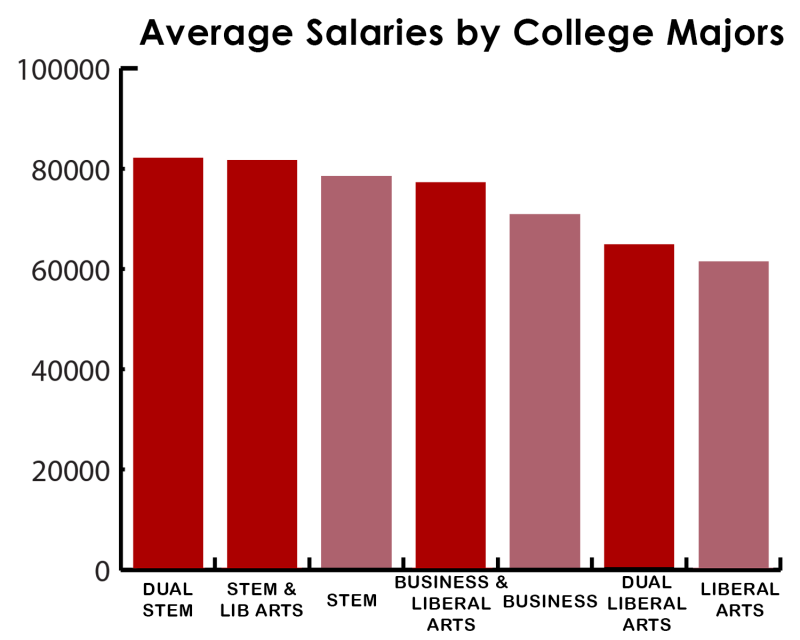As a first-year, the phrases “double major” and “triple major” elicit simultaneous awe and puzzlement from me. How do these double and triple majors do it? How do they stay calm under all the pressure they must feel?
Caroline North, a sophomore accounting and finance double major, first came to Trinity, like most students, indecisive and unaware of what she wanted to study. After taking a few business courses, she found the accounting and finance majors most interesting.
“I ran my degree audit, and I realized I could make both of them work, so I just decided it’d be cool to do both,” North said.
It seems that the ease in double-majoring comes from, in North’s case, the overlap between the majors. Elyse Andrews, a junior triple major in art, communication and Spanish, found that there was also enough overlap between her majors and the Pathways requirements.
Andrews felt that those classes were unique to the Trinity education.
She did find it difficult to fulfill some of those Pathways requirements.
“With all my overlap, I’ve been able to get around my Written Communication and Oral Visual Communication requirements, no problem, but the cluster and Upper Division Pathway requirements are harder [to fulfill],” Andrews said.
So why pursue multiple majors? For Andrews, she felt like the triple major would help her in her future career.
“It sounds wild, but I’ve been lucky to know what I want to do, which is graphic design. I knew I needed something to make my skills more marketable, so I took a communication class, and I fell in love with that,” Andrews said.
Her interest in pursuing her Spanish major came from a love of language and motivation to keep using it.
“The reason why I also made Spanish a major is like, to me, what’s the point of getting a minor in a language and then not take any more classes or keep learning it for the next year and a half at school … I want to be fluent and understand the culture,” Andrews said.
Andrews hopes to put what she’s learned in working towards her Spanish major to the test when she goes to Madrid this summer.
Alice Von Ende-Becker, a junior art history, mathematics and economics triple major, explains how much work goes into her pursuing three majors.
“I’ve taken 18 or more hours every semester since my freshman year and I’ve done summer school every summer,” Von Ende-Becker said.
Becker also gave some insight as to how she managed to complete multiple majors.
“I guess it’s just time management. And I’ve always been a person who likes to keep myself busy,” North said.
“I like what I’m doing so it makes it easier to work hard,” North said.
North encourages anyone considering double-majoring or triple-majoring to talk to their advisors and reach out to the chairs of different departments.
“Explore your interests and if you find two things that are really exciting to you, go for it,” North said.
Andrews adds that you won’t enjoy life as a double or triple major if you are not passionate about your majors.
“I fully love all three of my majors and everything I do, so if I didn’t like it, I guess I would be more stressed,” Andrews said.
It seems as though the general consensus is this: pursue multiple majors if they align with your genuine interests, if the necessary classes for each major have some overlap, or if some classes can also count towards Pathways credit.
While these students recommend double-majoring, they also emphasize not to feel bad if you are pursuing a singular major.
“There’s nothing wrong with only having one major,” Andrews said.
James Shinkle, pre-med advisor and professor of biology, agreed with Andrews, explaining that multiple majoring works for some students and not others.
“Just because you start that second major doesn’t mean you have to finish it. You can mine out a lot of good. Majors are designed to have a student have a set of experiences in that discipline that will give them qualifications and insights into how scholarship works in that discipline,” Shinkle said.
Most health professions students, for example, are advised to pick one major and then take classes that interest to them to increase their skill set.
“We have people come in thinking they ought to be a business major because medicine has gotten to be business. Our Business Department offers courses that would help someone who is going to be a physician navigating the business world. But I would say that would take about four classes. There are a lot of places to grab a course at a time and put together a package that really makes sense,” Shinkle said.
Students that are interested in double or triple majoring should start out with taking a couple classes in the area of interest. After trying out a couple of classes, students should then speak to their advisor for some more consultation.







